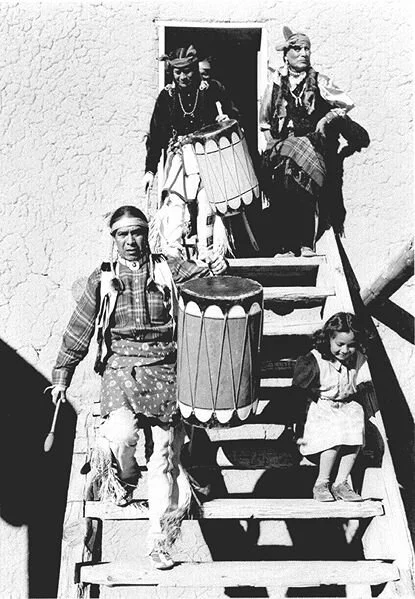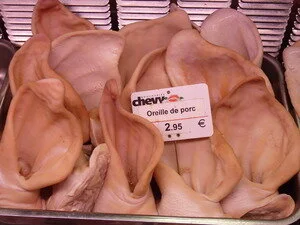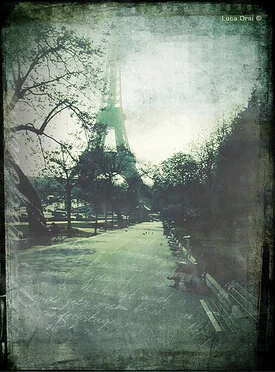All in cultural immersion
Two Ex-Pats in Girona, Catalonia
words + photos by Elyn Aviva
“I can’t believe we live here!” I said to Gary as I stared in fascination at the multicolored reflections dancing over the rippling surface of the Onyar River.
 River OnyarHe squeezed my hand and leaned over the railing of the stone bridge. Ducks floated by, luminous in the evening light. “I know just what you mean,” he replied. “Who’d have thought that what started off as a whim would end up being such an adventure?”
River OnyarHe squeezed my hand and leaned over the railing of the stone bridge. Ducks floated by, luminous in the evening light. “I know just what you mean,” he replied. “Who’d have thought that what started off as a whim would end up being such an adventure?”
I nodded, admiring how the brightly lit cathedral spires were silhouetted against the velvet black sky. I sighed, contentedly. Then, hand in hand, Gary and I strolled across the medieval bridge that divides one part of Girona from the other. We walked down the Rambla and sat down at a sidewalk café. We ordered a cortado, a fragrant cup of espresso laced with a touch of milk, and an artisan beer. We looked at each other and grinned. Ah, what a life.
Just two years earlier Gary and I had been pondering what to do next with our lives. We knew we enjoyed traveling in Europe and wanted to do more of it with less hassle. Why not move to Europe for a few years, I suggested. We weren’t getting any younger. We had good health, enough money, a love of adventure, and much to be grateful for. If not now, when? Gary agreed, and we began making plans to move to Spain, a country we had lived in briefly once before.
Discover the Exotic on a Road Trip
“None of your business,” she said. The short, curly, white hair bounced as she shook her head, but the brown eyes smiled in her beautiful, tanned and weathered face. Half Navajo, Suzie (not her real name) has lived in Rio Grand pueblos in New Mexico all her life. We were sitting in a rambling adobe house near the village where she lives with her husband. Grandchildren and daughters dropped in from time to time as we talked. The smell of cedarwood smoke curled around us, and tin-framed pictures of saints glinted on the walls.
words + photos by Shannyn Sollitt*
Three weeks without electricity wasn't the hard part. It was the pig and chickens in the kitchen, and the family of chickens next to my bed making grumbling baby chicken sounds beneath their mother's wings every time I moved. It rains a lot at this time of year. They have to go somewhere indoors, and so does the pig that also made nocturnal grunting and farting sounds.
I maneuvered to set up my bed in their quadrant. I was grateful not to have to sleep with the workers, or in a hammock over the rest of the family, or on the floor with the fleas. When it is dark at 5:30 p.m. and the rooster crows at 3:30 a.m., it is a big deal where one spends that much time in oscuro. (Such a great Spanish word for darkness!).
I chose to sleep with the animals rather than people. I could pop on my headlamp in the middle of the night and converse with my best friend, write in my diary, and work on translating a beautiful piece on the People of the Sierra Nevada, written by a Swiss priest in Spanish. The book was a gift to Asdrubal's father, the Governor of the Arhuaco for the past 20 years.
The headlamp worked great until the moths started pecking at my eyes. I named the pig Wilbur in honor of Charlotte the spider. I developed deep compassion for him when people threw rocks because they didn't like where he was at the moment. He appreciated having his belly scratched. No one else was kind to him.
My decision to leave Asdrubal's farm ultimately became a question of clean water - well, clean in general.
I just began the book ‘Life is a Trip’ by Judith Fein. What an inspiration. Stories with heart, just begging the questions: Could I write about a few of my recent experiences? Do I really want to try? And would anyone really care?
My introduction to writing began with a Spiritual Writing Workshop in the Yucatan several years ago, led by none other than Judith Fein. To be honest, I hated writing. But that trip gave me something to write about. Judie actually encouraged us and made writing fun. Is that possible? I actually began to enjoy trying to piece together my thoughts into a cohesive, semi-understandable story. And so, with that crude introduction, I continue.
 photo by Stephen Poff via Flickr (common license)I have begun a mid-life journey, unexpectedly. For many years, I have taught children who struggle in school, offered workshops on learning disabilities, was even on national TV and radio, had a wife of 30+ years, raised a wonderful family, bought several homes in the suburbs. You would think I was leading a fulfilling life. I did all the proverbial right things. Yet, I was bored, frustrated and angry. Something was missing. I realized that I found the way Americans interact and connect shallow and I began to question who I was. What do I have to offer? What were my gifts and skills? And what do I really want to experience out of life and people? I wanted something real and authentic.
photo by Stephen Poff via Flickr (common license)I have begun a mid-life journey, unexpectedly. For many years, I have taught children who struggle in school, offered workshops on learning disabilities, was even on national TV and radio, had a wife of 30+ years, raised a wonderful family, bought several homes in the suburbs. You would think I was leading a fulfilling life. I did all the proverbial right things. Yet, I was bored, frustrated and angry. Something was missing. I realized that I found the way Americans interact and connect shallow and I began to question who I was. What do I have to offer? What were my gifts and skills? And what do I really want to experience out of life and people? I wanted something real and authentic.
And then Cabo San Lucas, Mexico, came into my life. Originally it was just a trip, a getaway to a beach paradise. But something in me yearned to find something real. I hunted the Internet and happened to find a children’s daycare center there and a boy’s orphanage, and in-between playing volleyball, getting exceedingly drunk on the beach, wondering what I was doing at a posh Cabo resort, where people seemed like shadows passing each other, I became a clown. Just like that. I wanted to visit the daycare center and orphanage but didn’t just want to walk in and say: “Hey kids, I’m here." So I pondered: How could I relate? How
 Because of a silver-colored horse named Concho and a notorious outlaw named Billy the Kid, my tether to the digital world got snapped. And, as it turned out, I was grateful. I’ll explain.
Because of a silver-colored horse named Concho and a notorious outlaw named Billy the Kid, my tether to the digital world got snapped. And, as it turned out, I was grateful. I’ll explain.
It all started about a year ago, when I heard about an intriguing trail riding vacation called the Tunstall Ride. It had a Billy the Kid theme and was based in southern New Mexico, major Kid territory. According to Beth MacQuigg, the ride manager, there would be three days of trail riding and we’d be traveling over some of the same rangeland that the Kid would have ridden over.
Riders would be housed in guest rooms on a private ranch adjacent to the property where the Kid once worked as a ranch hand. Known as the Tunstall Ranch, it was owned by his boss, Englishman John Henry Tunstall. Billy was riding with him one day when Tunstall was gunned down, was the first person to be murdered during the infamous Lincoln County War.
That bloody conflict aside, the land we’d be riding over was reputed to be some of the Kid’s favorite country. Beth told me that most people would be bringing their own horses, but for those of us who were horseless, like me, rental horses could be provided. As someone who loves horses, trail riding, and Western lore, the Tunstall Ride sounded immensely appealing, and I signed up. I signed my husband up, too. Though Terry doesn’t ride, he could hang out at the ranch and join us for meals and explore the historic sites with us that we’d be visiting without the horses.
[more from our SPOTLIGHT ON PORTUGAL series this week... ]
When I was a little boy, stories were told around the fireplace about ancestors who were Barons to the monarchy in Portugal and high magistrates to the Tudor monarchy. I always found this exciting and special. I was also a bit skeptical as there were no documents to this effect --only antique photos that could have been gathered at any antique store. Over the years, I made some cursory searches on the web and obtained information about my father and his parents' origin, but nothing was certain, and I had a fair amount of doubt because we are a family known for telling good yarns or, to put it more bluntly, having a proclivity for embellishment.
In September 2009, I decided to do further research on the Portuguese family story to determine where legend and fact intersected. I contacted the Portuguese diplomatic office in Providence, RI and was directed to the Portuguese Consulate in New York. After explaining my intent, I began to correspond with the most important contributor to this story, Miguel Carvalho. He was enthusiastic about my personal Portuguese project and we began to work with the scant information I had-- the surname Soares, the City of Porto and the legend of a family connection to the wine trade. Soon afterwards, I received an email from a history professor from Porto named Gaspar Pereira. He was generous with his research finding that, in 1780, there was a business concern called Soares & Irmao (brother) LLC, and that the business was comprised of two brothers-- Jacquin Manoel Soares and Jose Henrique Soares. Jose Henrique Soares was awarded peerage as the Baron of Ancede by Queen Maria II da Gloria in 1842.
Fear and Longing in Scotlan
When I was twenty I got on a plane and went to Edinburgh, Scotland, to live for a year. It was 1978 and I had just graduated from college and was headed to Scotland because I had won a fellowship from a foundation that wrote me a check for $6,000 and said have a good time. I had to do a project outside the United States and I chose one in Scotland because it seemed more exotic than England and yet they still spoke English. Kind of.
In A Pig's Ear
by Dorty Nowak
There are 72 recipes for animal body parts I have never eaten in Le Meilleur Cuisine de France. I purchased the cookbook, a staple in French kitchens, when I first moved to Paris, and over the past five years it has become a trusted guide for my culinary adventures. However, the section titled “Les Cochonailles et Les Abats” (Pork Products and Offal) remains untried territory.
Now Playing in Paris
by Dorty Nowak
Several years ago my husband and I moved to Paris. Although I was an avid student of French culture and cuisine, my knowledge of the French language was minimal. Freshman year in college I dropped out of French 101 because partying was much more fun than memorizing vocabulary, a decision I’ve regretted ever since. Over the years I had accumulated several “French for Travelers” texts, some Berlitz tapes, and enough rudimentary vocabulary to get by on my occasional vacations in France.
It may have started in 3rd grade—this need for transformation. Unlike most kids who would say, if asked, that their favorite holiday was Christmas, mine was Halloween. Whether dressing as a ghost, a witch, a gypsy, or a bum the idea of becoming someone else for even a short time held and continues to hold a fascination for me. Junior High brought other attempts to change - experimenting with make-up, trying to adopt an exotic accent, changing my name from Judy to Judi. High school was a time to learn more about who I was, but mostly to try not to stand out from the crowd. Then, at university all hell broke loose. It was the early 70’s at a very liberal university in Colorado. My liberation that year consisted of wearing jeans to class, letting my hair grow long and straight, shedding my make-up, and trying on radical, new ideas. But then as I got older, I lost my edge. I became a woman who is personable, somewhat outgoing, active in my church and community, but most often enjoys just staying at home, reading or doing art projects. I suppose this places me in the “Boring, but nice” demographic.
 I didn’t even think about transformation as I packed my bags for my trip to Kenya. I work for a non-profit, Waterlines, located in Santa Fe, New Mexico, that funds clean drinking water projects in developing countries. One of the great benefits of this work has been the opportunity to visit projects that our donors have sponsored. The two week period was spent in rural areas of Kenya, four hours from Nairobi. Most of the projects we visited were schools where Waterlines, in partnership with the local communities, has funded rain collection tanks. These large tanks (33,000- 50,000 liters) are filled with rain water collected through gutters from the roof of a classroom during one of the two rainy seasons Kenya has each year. Without these tanks, children are required to bring water from home or spend class time going to a river several kilometers away to haul back polluted water for drinking and cooking. Obviously neither is a good solution to the drinking water problem. For me, a former public school teacher, visiting schools is a holiday! It is both inspiring to see how much teachers do with so little in resources, and sad to see how the students struggle to pay fees for secondary school and learn without adequate books, lab equipment, or even pencils and paper.
I didn’t even think about transformation as I packed my bags for my trip to Kenya. I work for a non-profit, Waterlines, located in Santa Fe, New Mexico, that funds clean drinking water projects in developing countries. One of the great benefits of this work has been the opportunity to visit projects that our donors have sponsored. The two week period was spent in rural areas of Kenya, four hours from Nairobi. Most of the projects we visited were schools where Waterlines, in partnership with the local communities, has funded rain collection tanks. These large tanks (33,000- 50,000 liters) are filled with rain water collected through gutters from the roof of a classroom during one of the two rainy seasons Kenya has each year. Without these tanks, children are required to bring water from home or spend class time going to a river several kilometers away to haul back polluted water for drinking and cooking. Obviously neither is a good solution to the drinking water problem. For me, a former public school teacher, visiting schools is a holiday! It is both inspiring to see how much teachers do with so little in resources, and sad to see how the students struggle to pay fees for secondary school and learn without adequate books, lab equipment, or even pencils and paper.
One morning last November, I was searching the internet in the school library when I came across a post on our school’s website. “A New Look at Study Abroad: 40 States in 40 Days – Taking Applications,” it read. The course was offering six hours of credit—three hours for writing and three hours for sociology. Immediately, my interest was piqued.
 Belmont University: A New Look At Study Abroad
Belmont University: A New Look At Study Abroad
I’m not an inexperienced traveler by any means. Between the ages of 6 and 16, my family traveled to 16 countries in Asia, Europe, North America, and South America. I’m pretty sure I had been to more countries than I had states.
This left a gap in my heart—I had always yearned to learn more about and see more of this country I call home. No matter where I went in the world, I always loved home the best. So, call me a homebody. Or maybe just call me an American.
After an extensive application process, I found out in December that I had been accepted. My parents were in full support and the planning began. But I don’t think reality hit me until I was standing on the tour bus and it began to move. This was really happening.
French Camp Failure
by Jules Older
As Effin and I left Vermont for French Immersion Camp in Quebec, I felt scared.
I had reason for fear. I nearly flunked French in high school. I did flunk Latin, got a D in German, just squeaked by Spanish. I kept switching languages in the forlorn hope I'd find one I was good at. I never did.
The first time I heard about Jews living in Cuba was when my parent’s friends said they were accepted/allowed to go on a mission trip to Cuba. Because they were Jewish, they could apply through a synagogue to go with a small group of Jewish Americans bearing medical supplies to travel to Cuba for a 10 day trip exploring Cuba’s Jewish culture. The idea fascinated me. I quickly did my research and decided this was going to be my next personal story to work on.
Ever since I sailed on Semester at Sea (SAS) in fall ’04, I wanted to go to Cuba. SAS is a unique study abroad trip that takes a cruise ship and transforms it into a floating university with up to 600 students from around the nation to learn and travel together for 100 days. Quite literally, a semester at sea. Cuba was scheduled as our last port until Bush nipped that in the butt. Venezuela was the replacement, a much more dangerous country than Cuba, if you ask me.
I just returned to Manaus from the Anavilhanas Jungle Lodge in the Amazon (actually on the River Negro which is indeed a black river not due to dirt but due to tanens from leaves and organic matter and has NO mosquitoes at all on the water...unlike the "muddy river" which has apparently has PLENTY.) Did I really need those malaria pills?
 It is unbelievably wet there....it is not called a rain forest for nothing..You cannot go out for 10 minutes without a rain jacket unless you don't mind consistently walking around looking as if you just lost the jungle wet tee shirt contest. I opted for the rain jacket (which doubled as my icebreaker a week ago when I was marching around in crampons on the Moreno glacier in Argentina but let's stick to one rain jacket adventure at a time.).
It is unbelievably wet there....it is not called a rain forest for nothing..You cannot go out for 10 minutes without a rain jacket unless you don't mind consistently walking around looking as if you just lost the jungle wet tee shirt contest. I opted for the rain jacket (which doubled as my icebreaker a week ago when I was marching around in crampons on the Moreno glacier in Argentina but let's stick to one rain jacket adventure at a time.).
Just so you know, before I go any further, I am as happy as I can be. I look just like a hairdresser's nightmare (or dream depending on your point of view) as my roots are huge and my curls are wilder than in the '60s. It is good that HAIR has returned to Broadway because I may go directly from the plane to a casting call. Truth is, as soon as I land, I am going to the grandkids to give and get some great hugs and smooches followed immediately by an appointment with the hairdresser.
by Judith Fein
Christmas lights fringed the adobe walls in downtown Santa Fe, and I was feeling gloomy. In a few days I'd be leaving the country for a work assignment, and I wouldn't be able to celebrate the holidays with the kids behind bars.
For several years, I had volunteered to teach them creative writing, and I'd become very attached to them. In spite of their crimes, I loved them because they were just kids. Their life stories were punctuated with abuse, abandonment, and pain, and I knew their young hearts would ache with loneliness during the holiday season.
Impulsively, I called the head of the jail. He said I could have a special holiday session with the kids the following night.
Almost all of the Hispanic and Native American kids were Christians, and I wondered if any of them knew what Hanukkah was. I spent the next day buying plastic dreydls (tops) and gold-wrapped chocolate coins called Hanukkah gelt, and then I cut up more than 600 paper chits. In case my Hanukkah idea was a dud, I bought and signed Christmas cards for the kids.
As I was leaving for my Hanukkah mission, my friend Kitt arrived at my house with an enormous 50-pound pillowcase full of candy. "A little something for the kids," she explained.
by Judith Fein
BE A TRAVELER AND NOT A TOURIST; IF YOU TRAVEL BETTER, YOU WILL WRITE BETTER.
Join award-winning travel journalists/photographers Judith Fein and Paul Ross on a CULTURAL IMMERSION TRIP TO TUNISIA, MAY 8-22, 2009.
The goal of the trip is to teach participants how to travel deeply in a safe, exciting, exotic, accessible country and to write about their experiences. The pieces will be read aloud to the group every day, and hands-on instruction will be offered in travel photography, no matter what your level of proficiency.
The 14-night, l5 day trip will include all the highlights of Tunisia-- from the ruins of Carthage to the island of Djerba during a festival dedicated to a woman; from cave dwellers to souk shopping; from Berber villages to Bedouin markets to the stillness of the Sahara desert at night. In addition to visiting the sites, participants will have contact with Tunisians from all walks of life--AND THIS IS THE HEART OF THE TRIP. You will go into homes, music studios, caves, kitchens, mosques and spend time with open-hearted, friendly locals while learning about their culture--how they think, eat, work, live, create art, worship and feel about the world.







